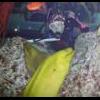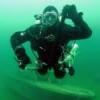
Knowledge obsolescence or just not useful....
#1

Posted 25 October 2006 - 08:10 AM
Without passing judgement on any instructor, agency or style of teaching, please share with us other examples of things you've been taught that you no longer do or are not applicable or accurate. This can be diving related or otherwise. It might be fun to see how many outdated or useless or marginally useful things we are taught and then if we choose to discard them ourselves and how and when.
And if you know the history behind why we USED to do them that would be even more interesting!
Contact me directly at Kamala@SingleDivers.com for your private or group travel needs or 864-557-6079 AND don't miss SD's 2018-2021 Trips! ....here! Most are once in a lifetime opportunities...don't miss the chance to go!!
SD LEGACY/OLD/MANUAL Forms & Documents.... here !
Click here TO PAY for Merchandise, Membership, or Travel
"Imitation is the sincerest flattery." - Gandhi
"Imitation is proof that originality is rare." - ScubaHawk
SingleDivers.com...often imitated...never duplicated!
Kamala Shadduck c/o SingleDivers.com LLC
2234 North Federal Hwy, #1010 Boca Raton, FL 33431
formerly...
710 Dive Buddy Lane; Salem, SC 29676
864-557-6079 tel/celfone/office or tollfree fax 888-480-0906
#2

Posted 25 October 2006 - 08:37 AM
"For the diligent diver, closed circuit rebreathers are actually safer than open circuit scuba." Tom Mount
#3

Posted 25 October 2006 - 09:01 AM
We teach students that if the reg is accidentally dislodged from their mouth, then they are supposed to go on some kind of "fishing expedition" to try and find it. This "skill" dates from the early days of single hose regulators, when there was only one second stage, and that was the only way to retrieve it.
In modern SCUBA, everyone should be diving with a backup second stage. Why then do we not teach students to grab their backup second stage first so that they have air, and then start looking for their primary? To my way of thinking, this would reinforce proper selection and placement of the backup second stage ("safety triangle", etc), so that it is properly secured and easily accessible at all times.
I'll even go a step further and state that I believe that we are teaching this skill totally wrong, and have been for years. Regulator recovery is fundamentally an OOA scenario. The priority in that situation is for the diver to GET AIR NOW. Instead of twisting and flailing about to recover their primary from who-knows-where, they should:
1. Grab their backup from its keeper and use that.
2. If the backup cannot be found, they should go to their buddy and share air.
3. Once they have a reliable source of air, then (and ONLY THEN) should they start looking for their primary.
I am sure I am way in the minority on this issue, but I am interested in what the rest of you think (and no cracks about pony bottles, OK?)
#4

Posted 25 October 2006 - 09:14 AM
OK, here is a skill that has always bothered me - regulator recovery.
The skill is still valid. I agree it's a good idea to pick up the octo before retrieving the primary. This skill is, however so easy and fast when it's not done kneeling, the picking up the octo is not an issue. When swimming horizontally, it's as fast to recover the primary as to pick up the octo.
DSSW,
WWW™
#5

Posted 25 October 2006 - 09:38 AM
When swimming horizontally, it's as fast to recover the primary as to pick up the octo.
Seems to me, that it would be rather unlikely that a person would be in a nice horizontal position if they have found themselves in a "loss of primary reg" scenario.
#6

Posted 25 October 2006 - 09:40 AM
When swimming horizontally, it's as fast to recover the primary as to pick up the octo.
Seems to me, that it would be rather unlikely that a person would be in a nice horizontal position if they have found themselves in a "loss of primary reg" scenario.
Most likey reason for losing the reg is getting kicked in the face.
DSSW,
WWW™
#7

Posted 25 October 2006 - 09:42 AM
I did not mean to imply that the skill is no longer valid - sorry if I gave that impression. What I meant to convey is that it should not be the first step in the process - more like step 2 or 3 (or even 4).The [reg recovery] skill is still valid. I agree it's a good idea to pick up the octo before retrieving the primary. This skill is, however so easy and fast when it's not done kneeling, the picking up the octo is not an issue.
I also agree 100% on the "kneeling" part, but that is another topic for another day. I only have time and energy to tilt at just so many windmills.
#8

Posted 25 October 2006 - 09:45 AM
In the 70's we were told to get out of the water if sharks showed up, now I pay big bucks to be in with them.
By all that is wet, I do hereby swear, (politely), and attest, upon pain of never diving again, (real or imagined), that I understand and affirm, that I agree to the above.
_________________________________________(log in name signature)
Signed and Dated
#9

Posted 25 October 2006 - 09:48 AM
#10

Posted 25 October 2006 - 10:09 AM
Actually, MOF can be a form of equipment rejection, which is a sign of potential anxiety. The fact that a diver has pushed his or her mask up does not necessarily mean they are distressed. However, divers have been known to push their masks up in situations where they are uncomfortable. I see it every time I teach a class - students are not comfortable wearing their masks, so they push them up on their foreheads.My favorite myth of course is the mask on the head signaling a diver in distress.
I was on a wreck dive once where the guy ahead of me on the down line turned and started bellowing at me through his regulator. He was obviously in a very stressed state, and I guessed that he was over-breathing his cheap rental reg (high current and a deep dive do that to people sometimes). I passed him my long hose, and then firmly grabbed both his BC strap and the anchor line. No sooner had I done that, when he pushed his mask off his face and tried to bolt to the surface from about 50 feet. If I had not had him securely in tow, I am certain he would have embolized.
In my experience, "MOF == Distress" is not a "myth" - divers do push their masks up when they feel stress or anxiety. That is not the only reason they do that, but it is certainly one of many possible explanations for why.
#11

Posted 25 October 2006 - 10:16 AM
#12

Posted 25 October 2006 - 10:21 AM
Actually, MOF can be a form of equipment rejection, which is a sign of potential anxiety. The fact that a diver has pushed his or her mask up does not necessarily mean they are distressed. However, divers have been known to push their masks up in situations where they are uncomfortable. I see it every time I teach a class - students are not comfortable wearing their masks, so they push them up on their foreheads.My favorite myth of course is the mask on the head signaling a diver in distress.
I was on a wreck dive once where the guy ahead of me on the down line turned and started bellowing at me through his regulator. He was obviously in a very stressed state, and I guessed that he was over-breathing his cheap rental reg (high current and a deep dive do that to people sometimes). I passed him my long hose, and then firmly grabbed both his BC strap and the anchor line. No sooner had I done that, when he pushed his mask off his face and tried to bolt to the surface from about 50 feet. If I had not had him securely in tow, I am certain he would have embolized.
In my experience, "MOF == Distress" is not a "myth" - divers do push their masks up when they feel stress or anxiety. That is not the only reason they do that, but it is certainly one of many possible explanations for why.
Thanks for making an excellent point. I think that most rescue trained divers will see the signs of a distressed diver before the mask goes onto the forehead. However that may be the first thing that a crew on a boat can notice. Normally, I need to see a couple of things before I worry about diver being distressed. However, if I see the more nervous attitude of a diver ready to lose it, I will be on guard and hope to be as good as Jim at catching it.
#13

Posted 25 October 2006 - 10:37 AM
A number of years ago I had one such diver thinking they were "helping me out" thought my tank as off, mixed up which way to turn the tank off/on and ended up turning my tank OFF and back a half turn while on my back as I was in the process of entering the water. Since it was cracked open a little, it wasn't until I was reaching depth that I noticed the issue.
Lessons learned for ME (this doesn't need to apply across the board):
1. Clearly state to other divers, please do not touch my gear or me when gearing up
2. Always make sure I can reach my own valves
I use this experience when discussing pre-dive checks (even though I had done mine and what happened behind my back when getting in the water). It's not a bad example of what could happen.
Once in a while, it is good to step back, take a breath, and remember to be humble. You'll never know it all - ScubaDadMiami. If you aren't afraid of dying, there is nothing you can't achieve - Lao-tzu. One dog barks at something, the rest bark at him - Chinese Proverb.
#14

Posted 25 October 2006 - 11:10 AM
"Love is blind but lust likes lacy panties" -- SanDiegoCarol
"If you're gonna be dumb, you'd better be tough." -- Phillip Manor
"If I know the answer I'll tell you the answer, and if I don't I'll just respond cleverly." -- Donald Rumsfeld
#15

Posted 25 October 2006 - 11:38 AM
Which is also an excellent point, and one I try to stress to my students. There is no reason for a diver to come to the surface, unless the dive is over or there is a problem. It could be a simple problem like "lost track of the boat" or something more serious like "lost track of my buddy". The bottom line is that from the crew's view (and vantage!) point, the diver is on the surface because there is a problem, and for no other reason. Now the mask goes on the forehead - is that significant or not? Sometimes it's hard to tell, so they start paying closer attention. Is that a bad thing? Usually not for the diver, but what if they're so busy paying attention to the (non-distressed) person, that they totally miss the guy that surfaces unconscious on the other side of the boat!Thanks for making an excellent point. I think that most rescue trained divers will see the signs of a distressed diver before the mask goes onto the forehead. However that may be the first thing that a crew on a boat can notice.
Bottom line is this - "don't look distressed when you're not". If you surface and you're OK, then communicate that info to the crew. Give them a big OK. Keep your mask on your face. Do whatever you need to do at the surface and get back underwater - that is where you should be anyway!
I agree 100% on this, and that's what we usually teach in Rescue classes. However, you are right there on the spot, and in a much better position to react than a Divemaster on a boat that is 200 ft away. Divers at the surface with masks on their foreheads make the boat crew unnecessarily nervous - it's a lot less stressful for them if you don't send the wrong signals.Normally, I need to see a couple of things before I worry about diver being distressed.
0 user(s) are reading this topic
0 members, 0 guests, 0 anonymous users




















